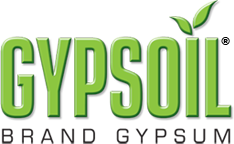2011 Symposium

The Midwest Soil Improvement Symposium: Research and Practical Insights into Using Gypsum was a one-day landmark scientific symposium held August 23, 2011, at the University of Wisconsin Arlington Ag Research Station.
Co-sponsors for the event included the UW College of Agriculture and Life Sciences (CALS); UW-Extension; the Conservation Technology Information Center and GYPSOIL®.
Research indicates that gypsum makes soils more permeable to rainfall, alleviates aluminum toxicity and supplies soils with calcium and sulfur, an often-depleted soil nutrient. Gypsum applications also improve particle aggregation, reduce erosion and have been shown to help keep phosphorus and other nutrients from running off agricultural fields.
 Leading researchers, gypsum experts and growers experienced using gypsum gave presentations on research findings, application recommendations and background on the production of gypsum in flue gas desulfurization (FGD) systems at certain coal fired utility plants was presented. Information documenting the safety of FGD gypsum use in agriculture was also presented.
Leading researchers, gypsum experts and growers experienced using gypsum gave presentations on research findings, application recommendations and background on the production of gypsum in flue gas desulfurization (FGD) systems at certain coal fired utility plants was presented. Information documenting the safety of FGD gypsum use in agriculture was also presented.
Symposium speakers included:
- Dr. Harry H. Schomberg, Ecologist, J. Phil Campbell, Sr, National Resource Conservation Center, USDA-Agricultural Research Service, Watkinsville, GA;
- Dr. Warren Dick, Professor, Environmental and Natural Resources, Ohio State University, Wooster, OH;
- Dr. Dexter B. Watts, Research Soil Scientist, USDA-Agricultural Research Service, Auburn, AL;
- Dr. Richard Wolkowski, UW-Madison; and Dr. Meghan Buckley of the UW-Stevens Point;
- Dr. Darrell Norton, Soil Scientist, National Soil Erosion Research Lab, USDA-Agricultural Research Service, West Lafayette, IN;
- Dr. Rufus Chaney, Research Agronomist, Environmental Management and Byproduct Utilization Laboratory, USDA-Agricultural Research Service, Beltsville, MD;
- Ron Chamberlain, director of gypsum programs for Beneficial Reuse Management, marketer of GYPSOIL® brand gypsum;
- John A. Andersen, Jr., President, Greenleaf Advisors Limited, Wilmette, IL, will provide an overview of the environmental impact of agricultural application of byproduct gypsum;
- Bob Paulson, Environmental Consultant, We Energies, Milwaukee, WI, will give background on gypsum production and supply.
Grower panelists included:
- Rodney Rulon, Arcadia, IN;
- Nick Miller, Oconomowoc, WI;
- Jack Maloney, Brownsburg, IN;
- Tom Greil, Waterford, WI;
- Larry Strupp, Slinger, WI;
- Scott Stoffel, West Bend, WI; and
- Dan Craig, Vernon, WI.
Downloads
Download symposium program here.
Download symposium presentations here:
- Gypsum Use in Agriculture: Impact on Environment (Norton and Andersen)
- Using Gypsum to Improve Crop Performance (Dick)
- Gypsum Effects on Soil (Schomberg)
- Applying Gypsum, When, How and How Much (Chamberlain)
- Wisconsin Research Update (Wolkowski and Buckley)
- How Gypsum is Produced (Paulson)
- Risk Assessment for Beneficial Use of FGD-Gypsum in Agriculture (Chaney)
Photos
Indiana growers Rodney Rulon (left) and Jack Maloney (right) look on as Nick Miller explains how he uses gypsum to add sulfur and improve soil structure at his Oconomowoc, WI, farm.
Wisconsin crop growers Dan Craig, Larry Strupp, Tom Greil and Scott Stoffel participated in a panel on using gypsum for alfalfa acres.
Dr. Harry Schomberg, an ecologist with the J. Phil Campbell Sr. Natural Resource Conservation Center, USDA-ARS, Watkinsville, GA, discusses soil effects from using gypsum including mitigation of toxic aluminum.
Dr. Warren Dick, Professor, School of Environment and Natural Resources, The Ohio State University, spoke about gypsum's impact to crop productivity.
Dr. Dexter B Watts, a research soil scientist with the National Soil Dynamics Laboratory, USDA-ARS in Auburn, AL, spoke on soil and water quality impact of using gypsum.
Dr. Darrell Norton, a researcher at the USDA-Agricultural Research Service National Soil Erosion Research Lab in West Lafayette, IN, explains how gypsum creates healthier soils, higher yields, cleaner water and provides other environmental benefits.
University of Wisconsin (UW) College of Agriculture and Life Sciences (CALS) soil scientists (from left) Drs. Richard Wolkowski (Emeritus) and Birl Lowery (Professor, UW Soil Science) describe gypsum trials now underway in Wisconsin at a plot tour.
Ron Chamberlain, director of gypsum programs for Beneficial Reuse Management, marketers of GYPSOIL® brand gypsum, presented gypsum application tips.
Dr. Meghan Buckley, assistant professor, College of Natural Resources, University of Wisconsin-Stevens Point, demonstrates aggregate stability from soil samples treated with FGD gypsum.
Dave Schuurman, chairman of Beneficial Reuse Management/GYPSOIL; Bob Paulson, senior environmental consultant with We Energies; and Gary Matney of Beneficial Reuse Management/GYPSOIL (from left) visit between sessions at the Midwest Soil Improvement Symposium: Research and Practical Insights into Using Gypsum.











